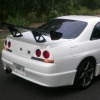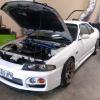R33 Rb30 Conversion
Announcements
-
Similar Content
-
Latest Posts
-
The S2 R33 and R34 both run a nylon composite compressor on a ceramic turbine. R34 has a larger a/r turbine housing
-
By joshuaho96 · Posted
There's absolutely no way the turbine is nylon when EGTs peak somewhere in the region of 800-900C. The compressor can be nylon. -
GTt too. But GTt being R34 they're a lot newer. From memory the R34 also runs a nylon rear wheel instead of ceramic. I might be wrong on it being nylon, but I'm certain they moved away from ceramic when they went from R33 to R34
-
Is that just in the context of a gtr and not a gtt because twin turbo vs single turbo?
-







Recommended Posts
Create an account or sign in to comment
You need to be a member in order to leave a comment
Create an account
Sign up for a new account in our community. It's easy!
Register a new accountSign in
Already have an account? Sign in here.
Sign In Now